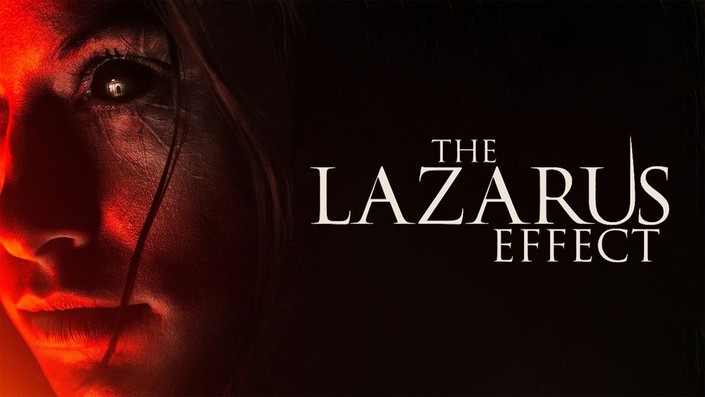The Lazarus Effect (2015)

“The Lazarus Effect,” directed by David Gelb and released in 2015, is a supernatural horror film that delves into the disturbing implications of bringing the dead back to life. With a screenplay penned by Luke Dawson and Jeremy Slater, the film explores themes of mortality, the ethics of scientific experimentation, and the unforeseen consequences of tampering with nature. Featuring a talented cast that includes Mark Duplass, Olivia Wilde, Donald Glover, Evan Peters, and Sarah Bolger, “The Lazarus Effect” presents a chilling narrative that raises profound questions about life, death, and the moral boundaries of science.
The film opens with a prologue that introduces the audience to a group of ambitious medical researchers who are conducting experiments on resurrecting the deceased. Led by the brilliant and determined Zoe (played by Olivia Wilde) and her fiancé, Frank (Mark Duplass), the team is on the verge of a breakthrough in their groundbreaking research. Their goal is to find a way to revive those who have died, harnessing the power of a serum that stimulates brain activity and restores life. However, the ethical implications of their work are soon called into question as they grapple with the potential consequences of their actions.
Tragedy strikes when Zoe suffers a fatal accident during a demonstration of their research. In a desperate bid to save her, Frank and the team decide to use their experimental serum on her, leading to a shocking resurrection. Initially, Zoe appears to be the same person she was before her death, but it soon becomes evident that something sinister has transpired. The serum, while successful in reviving her, has also altered her in unexpected and terrifying ways.
The film effectively builds tension as the characters navigate the moral dilemmas of their actions. Frank’s desperation to save Zoe is palpable, and Duplass delivers a convincing performance that captures the emotional turmoil of a man grappling with love and loss. As Zoe returns, her behavior becomes increasingly erratic, and the audience is left to wonder whether she has truly returned to her former self or if something darker lurks within her.
Olivia Wilde’s portrayal of Zoe is both captivating and unsettling. She transitions from a vibrant, loving partner to a character haunted by the aftereffects of her resurrection. Wilde expertly conveys the complexity of her character, balancing moments of tenderness with chilling outbursts that leave both her friends and the audience questioning her true nature. The transformation from life to death and back again is a central theme of the film, and Wilde’s performance anchors this exploration with depth and nuance.

The supporting cast plays a crucial role in amplifying the film’s tension. Donald Glover, as the tech-savvy character, provides a mix of comic relief and moral insight, serving as a voice of reason amid the chaos. Evan Peters and Sarah Bolger, portraying other members of the research team, add layers of conflict and camaraderie that further complicate the ethical landscape of their experiment. The dynamics among the group create a sense of urgency as they grapple with the implications of their actions and the growing threat that Zoe now poses.
One of the film’s strengths lies in its exploration of the ethical boundaries of science. “The Lazarus Effect” poses significant questions about the morality of reviving the dead and the potential repercussions of such actions. The characters’ initial excitement over their success quickly gives way to fear and confusion as they confront the reality of what they have done. This moral ambiguity drives the narrative, forcing viewers to contemplate the dangers of unchecked ambition and the desire to play God.

The cinematography in “The Lazarus Effect” enhances the film’s suspenseful atmosphere. The use of dim lighting and shadowy settings creates a claustrophobic environment that heightens the sense of dread. Gelb’s direction effectively utilizes jump scares and unsettling imagery to keep the audience engaged while also exploring the psychological horror of the situation. The combination of practical effects and CGI contributes to the film’s eerie tone, making Zoe’s transformation both visually and emotionally impactful.
As the narrative unfolds, the stakes escalate, leading to a series of shocking revelations and confrontations. Zoe’s resurrection brings with it a darker side that challenges her friends’ understanding of who she truly is. The film masterfully navigates the tension between the familiar and the uncanny, as the group must confront the terrifying reality that the woman they loved may no longer be the same.

The climax of “The Lazarus Effect” is both thrilling and thought-provoking, culminating in a confrontation that tests the limits of love and friendship. The moral dilemmas faced by the characters come to a head as they grapple with the consequences of their experiment. The film’s conclusion leaves viewers with lingering questions about the nature of life and death, the ethical implications of scientific advancements, and the lengths one would go to for love.

In summary, “The Lazarus Effect” is a compelling supernatural horror film that delves into the ethical dilemmas surrounding life and death. Directed by David Gelb, the film combines elements of psychological thriller and horror, driven by strong performances from its talented cast. Through its exploration of resurrection and the moral consequences of scientific experimentation, “The Lazarus Effect” invites viewers to reflect on the complexities of love, loss, and the human desire to transcend mortality. With its chilling atmosphere and thought-provoking themes, the film stands as a haunting reminder of the dangers of playing with the natural order of life.
Suggested videos for you:
Suggested videos for you:











